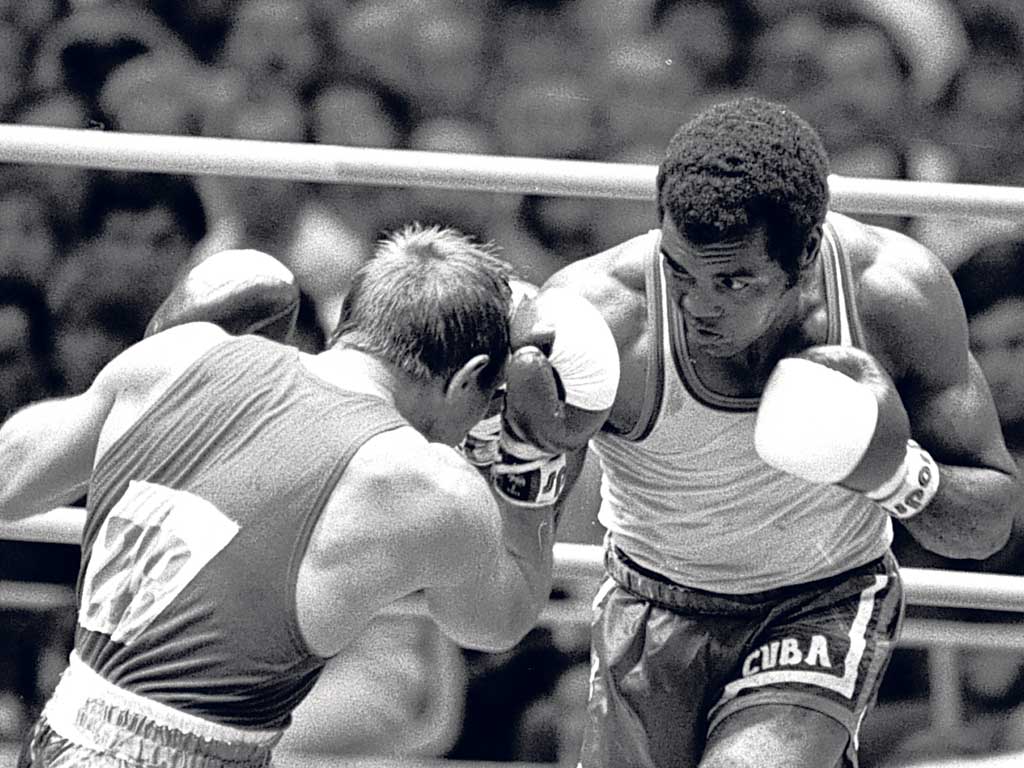Teofilo Stevenson: Boxer regarded as the greatest never to fight for money

Teofilo Stevenson, who has died of heart disease at the age of 60, was one of the best heavyweight boxers of his generation, and was widely regarded as the greatest boxer never to fight for money. He won gold medals at three consecutive Olympic Games from 1972 to 1980, in Munich, Montreal and Moscow. He said of that era: "The Olympic Games in Munich and Montreal are the fondest memories I have from my life, the best stage of my career."
Stevenson, known in his native Cuba by the nickname "Pirolo", was born in Puerto Padre in the Las Tunas province of eastern Cuba in 1952, the son of a Vincentian immigrant father and a Cuban mother. He began training at the age of 14 and had his first major fight against Luis Enriquez, who won on points.
He went on to win the gold medal at half-middleweight in the Cuba Junior Championships in 1968 and gained silver the following year at the 50th Playa Giron national boxing tournament. A year later he knocked out Nancio Carrillo, who had represented Cuba at the 1968 Olympics in Mexico City. This string of victories brought him recognition from the Cuban trainer Alcides Sagarra and the boxer Andrei Chervonenko, on loan to Cuba from the Soviet Union. They began coaching Stevenson for the forthcoming Olympics.
At Munich in 1972 he deftly defeated the American Duane Bobick when the referee stopped the match in the third round. Bobick had anticipated an easy match, having previously beaten Stevenson, but was surprised by the dramatic change in his opponent's power and tactics, a result of his intensive training regime.
The German boxer Peter Hussing was likewise dispatched in the second round. Hussing said that he had never been hit so hard. Stevenson's scheduled opponent in the final, the Romanian Ion Alexe, had a broken hand, giving Stevenson gold. Succeeding George Foreman as Olympic heavyweight champion, Stevenson had won Cuba's first ever Olympic boxing gold medal.
When Stevenson won his first world title, in 1974, promoters began to court him for a match-up against Muhammad Ali, in what was being billed as "the fight of the century". But Stevenson said no, turning down $5 million. "I wouldn't exchange my piece of Cuba for all the money they could give me," he declared. "I prefer the affection of eight million Cubans". A piece in Sports Illustrated bore the headline "He'd Rather Be Red Than Rich".
"Just the sight of him is enough to make a grown fight manager cry," the feature began. "The guy stands 6ft 3in and he weighs 214 pounds – with most of it looming in wide, powerful shoulders, a deep chest and long, heavily muscled arms. Given two, maybe three more years, he probably could become the professional heavyweight champion of the world. But he most assuredly will not."
Beyond his love of Cuba, Stevenson also expressed admiration for Fidel Castro, saying of him in a 2007 interview: "He has a big heart, he has great feelings for others, he thinks a lot of others. And what is important are his humanitarian and pacifist ideas."
By the Montreal Olympics in 1976, Stevenson was at his peak. His fierce right hand took down both Pekka Ruokola of Finland and the American John Tate in the first round of their bouts. Mircea Simon of Romania retired in the third round of the final, giving a second gold medal to Stevenson.
The United States boycotted the Moscow Olympic Games four years later, so there was no opposition from his American rivals. Faced with an easier field, he won his first two fights with knock-outs then prevailed on points against the Hungarian Istvan Levai before winning the gold with a victory against Piotr Zaev of the Soviet Union.
He had followed up his 1974 World Championship win with victories in 1978 and 1986. However, his 11-year unbeaten run ended in 1982 at the World Amateur Championships in Munich, when he lost to Francesco Damiani, who would go on to become the first heavyweight champion recognised by the World Boxing Organisation.
Stevenson should have had the opportunity to defend his Olympic title at Los Angeles and Seoul but Cuba boycotted both these Games. He then decided to take retirement, bringing to an end a career of 321 fights, of which he had won 301. He received a number of awards, including the Val Barker Trophy (1972) and the Merited Master of Sport of the USSR (1972), an honour rarely accorded to non-Russians. Inrecent years he had worked as theVice-President of the Cuban BoxingAssociation. Taken ill earlier this year, he had expressed surprise at the number of well-wishers who contacted him. "People called me from all over Cuba, from other parts of the world, even from Miami," he said.
Fidel Castro said in tribute: "Teofilo Stevenson deserves the recognition of the Cuban people for his athletic success derived from his discipline, his dedication to the sport, his courage... We believe that he set a very valuable example... This young man, the humble son of a humble family... said he would not exchange his people for all the dollars in the world."
Teofilo Stevenson, boxer: born Puerto Padre, Cuba 29 March 1952; married four times (two children); died Havana 11 June 2012.
Subscribe to Independent Premium to bookmark this article
Want to bookmark your favourite articles and stories to read or reference later? Start your Independent Premium subscription today.

Join our commenting forum
Join thought-provoking conversations, follow other Independent readers and see their replies